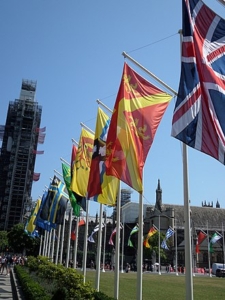Post Brexit: Fine balance between devolution of EU powers and the future of a ‘United’ Kingdom

The UK joined the EU on 1 January 1973. From that day forward, the EU has been the overarching authority formatters of: trade; competition; the environment; agriculture; fishing; security; data; and much more – governing the daily political, business and personal lives of all the bloc’s 450 million citizens – including 67 million across the United Kingdom.
The UK is empowered to make policy decisions in these areas – but must remain compliant to all EU directives, regulations and case law.
Westminster alone legislates for matters such as trade and competition law. Neither of these – together with some other defined ‘reserved’ or ‘excepted’ matters – have been ‘devolved’.
In 1999, non-reserved matters were devolved by Westminster to Wales, Scotland and Northern Ireland. In this sense, the UK’s four governments presently share these competencies with the EU, legislating in their respective territories.
The Scottish and Welsh Parliaments, for example, can pass laws relating to agriculture and the environment as ‘devolved’ matters – irrespective of what Parliament legislates for England, so long as they comply with EU laws.
At the end of the Brexit ‘transition period’ – 23:00 GMT on 31 December 2020 – the ‘reserved’ and ‘devolved’ competencies of the UK and ‘devolved administrations’ will remain the same. However, their all have discretion to make policy within their remit – but free of the EU Treaty requirement to comply with EU law.
Discussions were held to avoid ‘potentially disruptive policy differentiation between the four nations’ once EU legal frameworks ‘fell away’. With 60 days until the end of the ‘transition period’, there remain disagreements as to how differences would be managed. The devolved administrations have all accepted the need for common policies in certain areas – but argue they should be ‘negotiated and agreed’ between the four nations rather than ‘imposed’ from London.
The situation is even more fraught for UK ‘Overseas Territories’ – listed below – including Gibraltar and the Falkland Islands. Neither the Channel Islands, nor the Isle of Man were part of the ‘devolution’ of powers process – and they, too, have largely been excluded from post Brexit-transition discussions. This despite most of them returning majority vote in favour of remaining part of the EU – in the case of Gibraltar 96% voted ‘remain’.
The Conservative Government made a clear choice – and has legislated – for a ‘hard’ Brexit. This means opting to leave both the ‘single market’ and the ‘customs union’ at the end of the ‘transition period’. Remaining in one or both would have ensured no friction across the borders in the island of Ireland and between Gibraltar and Spain.
This decision is now highlighting both practical and political difficulties with mounting tensions that have the potential to challenge the very concept of a ‘United’ Kingdom.
As Great Britain exits the EU from 1 January, Northern Ireland will stay in the EU ‘single market’ for goods. The shared border on the island makes it impractical to do otherwise – and ‘Good Friday’ agreement that enshrines the ‘peace process’ demands that there shall be no border checks. Instead, there will be new checks and controls and requirements for all goods entering Northern Ireland from Great Britain.
The City of Birmingham University established a specialist ‘Brexit’ faculty in 2017 to study and forecast impacts of Brexit. They have, amongst many other in-depth analyses over the last 3 years, recently published findings on devolution, with a specific focus on attitudes and trends in Gibraltar and Scotland – and attitudes towards Westminster in the English regions, using West Midlands as an example.
Their finding adds academic weight that underpins the general feeling that the United Kingdom is drifting apart. Consider the voices in Parliament from the ‘red wall’ constituencies – Tory MPs that now represent long-held Labour seats. Unless there are strong forces and clear direction that begins change perceptions about levelling the playing field, the forces that will lead to fragmentation of the United Kingdom will grow.
The ‘Internal Market’ Bill, presently passing through Parliament is proving to be both divisive at home and potentially damaging to the UK’s reputation Worldwide – Presidential candidate, Joe Biden, making it clear that there can be no preferential US-UK Trade Agreement possible if the Bill becomes an Act.
Devolution – the final irony
One requirement on the UK when joining the Economic Community in 1973 was to ‘devolve’ the power of Westminster into 8 UK ‘regions’ – including – for example – Scotland, Wales and Greater London. Given complexity of the task a ‘transition period’ of 30 years was allowed.
In the early 2000’s – with little evidence of progress – Tony Blair’s government received a formal warning from the European Commission of default on the agreement and required to get on with it. John Prescott was the Minister responsible – setting up regional assemblies and, for instance, trying to bring 43 county police forces and fire brigades into 8 ‘regional’ forces.
Westminster has simply continued to be the single overarching legal authority – still with 650 MPs rather than the envisaged much smaller ‘coordinating body’ sitting between the 8 regions and the European Parliament – a regional model similar to many across the rest of Europe.
It is curious to think that Brexit – given in the manner of implementation driven by the present Government – is fuelling the devolution debate…
…and if that happens – we may yet end up with the 8 autonomous regions proposed by Brussels nearly half-a-century ago!
References:
https://commonslibrary.parliament.uk/eu-powers-after-brexit-power-grab-or-power-surge/
UK Overseas Territories: Anguilla; Bermuda; British Antarctic Territory; British Indian Ocean Territory; British Virgin Islands; Cayman Islands; Falkland Islands; Gibraltar; Montserrat; Pitcairn Islands; St Helena, Ascension and Tristan da Cunha; South Georgia and South Sandwich Islands; Turks and Caicos Islands.
Photo: Flags of the nations of United Kingdom in Parliament Square, 2019
